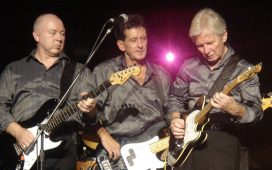Simon Armitage wanted to be in a band long before he became a poet. “It came before any interest in writing or literature,” he says of his passion for music.
“I grew up as somebody living in a small village in West Yorkshire for whom John Peel was the connection with the universe and David Bowie was a kind of Jesus figure. I’ve never stopped listening.”
Armitage has won numerous awards and accolades for his poetry, was made Poet Laureate last year – a post he will hold until 2029 – and received the CBE for services to poetry in 2010.
The i newsletter cut through the noise
He published his first of 17 collections of wryly observed poems around modern life in 1989, while he was working as a probation officer in Oldham; he resigned the post in 1994 to focus on poetry.
Broadcasting and presenting, television and radio-writing, novels, travel writing and translations of traditional verse all followed. And the music followed him. In 2008, in his forties, he published his second memoir Gig: The Life and Times of a Rock-star Fantasist and formed The Scaremongers, a band whose jangly guitar sound embraced his love of The Smiths (he also interviewed Morrissey for The Guardian).
They released just one album, 2010’s Born in a Barn, but Armitage is fulfilling that rock-band longing once more: in the ambient post-rock group LYR (Land Yacht Regatta), who have released their debut album Call in the Crash Team.
Two forms with a long-standing connection
Armitage is by no means the first poet to set music to poetry. When we meet, in March, a few days before their debut gig, he reels off the many others who have worked with music or tried their hand at libretti or hymns: the first Poet Laureate, John Dryden, whose Song for St Cecilia’s Day was composed for a feast day in the patron saint of music’s honour; John Betjeman with his tea-room jazz album Banana Blush; Carol Ann Duffy’s readings with a musician…This project pulls his two loves – poetry and music – together; Armitage delivers dolorous spoken-word monologues elevated by multi-instrumentalist Patrick Pearson’s ambient electronica and piano, and singer-songwriter Richard Walters’ emotive vocals.
Having previously admitted his discomfort as a singer, Armitage, 57, finds that writing, discussing song arrangements and – in performance – “standing still and saying things”, fits more within his comfort zone.
“It feels… natural. I’ve dabbled and flirted with being in bands in the past but have never found a comfortable role, a role that fits my interests and specialisms.”
‘I don’t have to be the load bearer’
The band was ignited by Walters, a fan of Armitage since school, when he saw the poet read an extract from his first memoir All Points North at an A-level English conference.
“It was dark, it was funny and I just found it really exciting.” The poet responded and the pair wrote a song together in 2011. As they discussed starting a spoken-word project, Walters thought of Pearson with whom he had worked on musical projects including the London-based indie band Liu Bei, and Pearson “jumped at the chance of doing something a little bit different”.
They sent Armitage a Dictaphone in the post, and that was the start – except nothing would happen for some time. “If I remember, I don’t think you’d put enough postage on it,” says Armitage, with the dry northern humour he applies to his poetry. “I’ve let it go. Just.”
While all three members live far from each other (Pearson in Devon, Walters in Hampshire) they feel very much a band, with a vast respect for each others’ talents. Despite the fame of their lyricist, there is no frontman, and interviews are conducted as a three-piece only. “I don’t have to be the load bearer,” says Armitage.
When the tracks arrived back from his bandmates, with music set to his poetry, he was thrilled. “They were far in excess of what I could have imagined. We wanted experimentation, discord, but didn’t want to produce something wacky and unlistenable.”
Unusual LYR’s post-rock may be, but it is surprisingly accessible – and beautiful. It’s redolent of Radiohead, Arab Strap and the delicate, swelling beauty of King Creosote and Jon Hopkins’s Mercury Prize-nominated Diamond Mine. “The word ‘beauty’ is definitely one that we’ve always thrown around,” says Pearson. “I’m fascinated in the way an arrangement can take you to a different emotive place.”“In opera, you’ve got all the boring talky bits in between the arias,” Armitage thinks aloud.
“I think we wanted to make spoken-word arias.”
Poems set to music
Call in the Crash Team comprises Armitage’s poems written specifically for the project alongside a handful already written: two from a pamphlet called Travelling Songs, while “Zodiac T shirt” was a response to Beck’s sheet-music release Song Reader, and “33 1/3” invoked Ian Curtis with its haunting whirr taken from the run-out groove of Joy Division’s Unknown Pleasures vinyl.
Armitage decided these poems were calling out for music. “I think they were waiting to be fulfilled in some way,” he explains. “At some level, they’ve all had a relationship with music that they were waiting for.”
The fictional characters of the poems express personal anxieties, like the woman’s lament at her partner’s lack of empathy in break-up song “Never Good With Horses”, as desperately sad strings, keys and plaintive vocals build. “Retrospectively, that ties into a lot of societal anxiety that we’re all feeling at the moment,” Armitage said in March.
“I don’t think we necessarily wanted to make an album that spoke to that theme, but that’s how it’s turned out. They are people in crisis, singing their siren songs, their wailings.”
When we speak again months later, Armitage reflects on how prescient Call in the Crash Team really is. “I think we’ve written the album of the summer [subject-wise], though without intending to.”
He has resisted commenting on the transient affairs of the moment in his poetry, but the global scale of the coronavirus forced him to turn to current events. In March he wrote “Lockdown”, which LYR translated into a song in isolation, with an accompanying video featuring actor Florence Pugh.
They have also recorded a live isolation video to “Never Good With Horses” – partly to keep up their spirits. “I can’t remember or imagine a bigger event in my life, past or future,” says Armitage. “In some ways it was impossible to not respond – I couldn’t hear, see or think of anything else.”
The poem begins in Eyam in the Derbyshire Dales, 30 miles away from where he lives with his wife and daughter, where the 17th-century bubonic plague broke out thanks to some infected flea-infested cloth from London.“I wanted the original poem to make the point that humanity has faced similar emergencies before, and very close to home,” says Armitage. “The Eyam story contained aspects of self-sacrifice; knowing such things have happened before makes us feel less alone, I think.”
It also references the Sanskrit poem “Meghaduta”, intended to globalise the issue. “Because the ‘Meghaduta’ is a fantasy piece I used it to suggest that the imagination will see us through, whether that’s the imagination of scientists who model vaccines, or the imagination of artists who see a brighter future beyond the immediate horizon.”
In a brighter future, we will once again hear LYR live, but for now, you would be hard-pressed to find a collection of music that, unintentionally or not, captures so perfectly the past few months’ unease and individual crises.
Call in the Crash Team is out now














